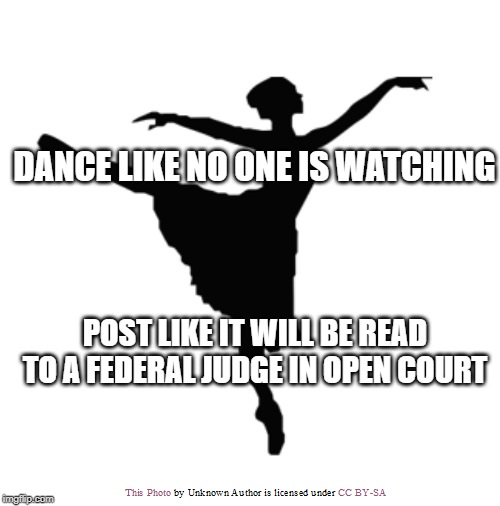

How does filing a routine notice of dismissal turn into a “deliberate attempt to circumvent the Court’s lawful order” resulting in sanctions? Plaintiff’s colorfully worded public Facebook posts regarding the case and the Judge may have had something to do with it…
The cases are De La Vega v. Microsoft Corp. and De La Vega v. Google LLC, both filed in the Waco Division in October 2019. Both Defendants moved to dismiss for failure to state a claim, the motions were fully briefed, and the Court set a hearing. Nothing remarkable. At this hearing, Judge Albright agreed with Defendants but gave Plaintiff the chance to replead to fix the deficiencies. In an interesting turn of events, Plaintiff’s counsel asked to address the Court, in response to the Court’s oral ruling, and stated that Plaintiff was essentially unable to fix the deficiencies by repleading. In light of this, the Court orally granted Defendants’ Motions and dismissed the claims noting that a written Order would follow. The minute entry reflected the dismissal with prejudice.
The day after the minute entry was entered, but before the Court's written Order was entered, Plaintiff filed a Notice of Voluntary Dismissal without prejudice. Both Defendants opposed the Voluntary Dismissal, noting that the Court’s oral ruling left no remaining claims that could be voluntarily dismissed. The Court then issued its written ruling granting Defendants’ Motions to Dismiss with prejudice.
The Court held another hearing whereby he questioned why Plaintiff filed a Notice of Voluntary Dismissal following his ruling to dismiss the claims with prejudice. While Plaintiff contended that he did not understand the Judge’s ruling was with prejudice, Defendants presented contrary arguments. The most interesting came in the form of Plaintiff’s Facebook post from the day before the Notice for Voluntary Dismissal was filed stating: “Today all my cases were grossly blatantly dismissed with the word “PREJUDICE” attached to all my law suits…” As expected, this slightly undermined the argument that Plaintiff did not know the dismissal was with prejudice.
Microsoft moved for attorneys fees associated with responding to the Notice of Voluntary Dismissal as well as sanctions. Finding that Plaintiff and Plaintiff’s counsel acted in bad faith by filing the Notice, the Court awarded Microsoft attorneys fees and ordered Plaintiff’s counsel to complete legal ethics courses. The Court further banned any attorney at Plaintiff’s counsel’s law firm from filing anything in the Western District of Texas ECF system until Plaintiff’s counsel provides proof of completion of legal ethics courses to the Court.
The moral of this story: Dance like no one is watching, email like it will be read aloud in a deposition, and tweet and post like it will be read aloud to a Federal Judge in open court.
Enjoy your social media responsibly!
Note: the sanctions in these cases were directed at one specific attorney for Plaintiff, the other attorney of record was not a subject of the Court's Order.
About
With over 50 years of combined experience with federal court practice in the Western District, our team boasts former federal clerks and outstanding litigators with unrivaled experience in local federal litigation. Our contributors are all located in the Waco office of Naman, Howell, Smith & Lee. With an office just blocks from the Waco courthouse, we have our finger on the pulse of the emerging patent litigation practice in the Waco Division of the Western District, and we want to share that expertise with you.
